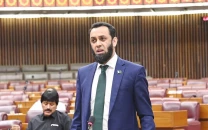Buck-passing: Soul searching at national level urged to solve security mess
Pakistan-Pakistan Dialogue Programme launched.

A large number of Pakistanis are greatly disturbed by the increasing tendency among people to blame outside powers for the ills facing the country. This was said by Regional Peace Institute (RPI) Executive Director Raoof Hasan.
In his opening remarks at the launch of the institute’s Pakistan-Pakistan Dialogue Programme (PPDP), he said there was a need for soul-searching instead of blaming everything on the US, India, the British and Jews.
Hasan said it appears we are losing out on the faculty of being able to rationally and pragmatically diagnose the reasons behind the problems we face today.
The dialogue was launched with a roundtable on “Learning lessons from South-Asian insurgencies and terrorism” by US Institute of Peace South-Asia Programmes Director Dr Moeed Yusuf at a hotel in Islamabad. The programme is being sponsored by the Hanns Seidel Foundation (HSF).
Hasan said that PPDP would provide an opportunity for scholars in the field to productively engage and to synthesise the nature and causes of the problems that the country was confronted with and delineate a way forward.
Dr Moeed Yusuf cited instances from contemporary history on how various states had addressed the challenge of insurgency, militancy and terrorism. He referred to some serious paradoxes that tend to impact every state’s endeavours to tackle such issues.
Yusuf cited the use and non-use of force, add-on and core factors that contribute to insurgencies and the unfinished process of nation building within South-Asian states, as the principle paradoxes.
He stated that on most occasions, the narrative of an ideology becomes more important than the ideology itself, and the states also try to create their own narratives. Yusuf said that in Pakistan, intolerance of religious diversity had created sympathy for violence.
He further stated that the top-down factors that had contributed to the upsurge of militancy included the lack of capacity of the state and its failure to provide security to the people on a daily basis.
In this regard, Yusuf blamed the weaknesses, in the domains of civilian law and criminal justice system.
He also said that counter-insurgencies in cities cannot be won by the military. No counter-insurgency would succeed unless the state comes out and tells its counter-terrorism apparatus, who the enemy is.
Dr Yusuf underlined that clear identification of the enemy, improvements in civil law and criminal justice system and bringing in moderate religious scholars to provide the counter-narrative are areas critical to combating an insurgency. He said that the war against militancy would not end with the operation in North Waziristan Agency (NWA). “It only begins there”.
The roundtable was attended Khurshid Mahmud Kasuri, Raoof Hasan, Afrasiab Khattak, Riaz H Khokhar, Aziz Ahmad Khan, Ashraf Jehangir Qazi, Sarwar Naqvi, Admiral (retd) Fasih Bokhari, Lt Gen (retd) Asad Durrani, Ahmer Bilal Sufi, Dr Rifaat Hussain, Dr Abdullah Riar, Ejaz Haider, Salim Safi, Reham Khan, Ahmad Siddiqi and others.
Published in The Express Tribune, July 18th, 2014.



















COMMENTS
Comments are moderated and generally will be posted if they are on-topic and not abusive.
For more information, please see our Comments FAQ